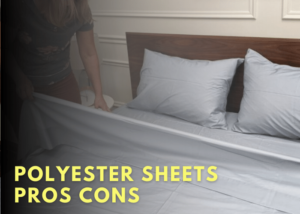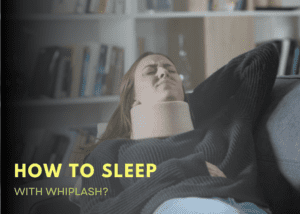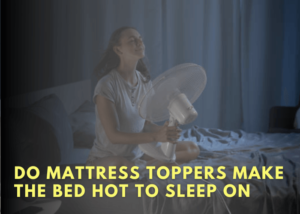Memory foam was originally developed as a flexible material in creating ideal cushioning systems for spacemen. Today, it is widely used in making comfortable beds across the world due to its promising benefits. However, there are a few health concerns to consider before investing in this product. So, is memory foam bad for your back?
Typically, memory foam mattresses are more expensive than other types of mattresses in the market. Despite its expensive price tag, bed buyers still opt for memory foam when it comes to managing back pain and other physical health issues.

Is Memory Foam Bad for Your Back When Sleeping?
According to health experts, almost 80 percent of the world’s population experience chronic back pain. Eventually, you will struggle with pain in your lower back as a result of improper sleeping positions. So if you’re thinking that this is age-related, think again.
Moreover, you won’t develop back pain from sleeping in memory foam. Rather, sleeping inappropriately can trigger back pain as well as spine misalignment. And this can get worse if you use a mattress that doesn’t provide you with enough support needed for the ideal sleeping posture.
How Do I Know If My Mattress is Causing My Back Pain?
In general, memory foam mattress doesn’t usually cause back pain. Most sleepers prefer memory foam to innerspring mattresses. The only thing that might trigger your back pain is your body weight and shape. Some people easily sink into the memory foam while creating misalignment on their spine which can cause your back pain.
In other words, not all sleepers can take advantage of memory foam mattresses. If your weight is evenly distributed through your body, then you can benefit from memory foam. Heavy sleepers, on the other hand, may not enjoy the same experience as their weight is heavier in specific areas. As a result, they easily sink into the memory foam which gives them spine misalignment and back pain.
Ideally, a memory foam mattress can adjust to different body shapes while making sure that bodyweight is evenly distributed throughout the surface of the mattress. In return, it relieves your spine and neck from extra pressure. If you keep on having back pain issues upon waking up, then it’s likely that your mattress is causing the problem.
What Type of Mattress is Best for Your Back?
Your weight and body type will help you determine the level of support you exactly need during sleep. Also, it will help you find the best mattress that perfectly fits your sleeping position and health condition. If you don’t choose your mattress wisely, it can lead to discomfort as well as sleepless nights and chronic back pain.
Here are some helpful tips in choosing the right type of mattress for your back:
- The mattress should keep your spine properly aligned throughout the night. Proper sleeping posture is essential in maintaining a healthy body while getting adequate sleep. The right mattress also helps you feel well-rested after waking up in the morning.
- Choosing a mattress is not one-size-fits-all, so you have to determine whether a too soft or too firm suits your body shape and weight. You may feel comfortable sleeping on a softer mattress, but not on something firmer.
-
Check the bounce level of the mattress by applying pressure on its surface. It should go back to the original form after several seconds. When you consider this feature, you can guarantee that your mattress will allow you to freely move while changing positions during sleep.
Is Gel Memory Foam Good for Your Back?
In 2011, gel memory foam mattresses were introduced in the market. It immediately gained popularity because of the extra level of support and comfort it offers. This type of memory foam mattress can conform to your body and distribute your weight equally across the mattress to achieve a “floating effect”.
Although this mattress is ideal for people with back pain problems, its heat retention technology traps heat. As a result, you feel overheated while sleeping on a gel memory foam. The discomfort can trigger your back pain and other health conditions.
Which Mattress is Best for Lower Back Pain?
You may have personal preferences when it comes to choosing the most comfortable mattress, but it should not be too soft or too firm to prevent lower back pain. The ideal option is soft and firm enough to support your lower back during sleep.
The memory foam mattress is a great choice because it offers a different firmness level to match your unique requirements. Also, it is soft enough to keep your spine properly aligned while sleeping. But this is not the only option you have, there are innerspring, hybrid, and latex mattresses to choose from.
The issue with innerspring mattresses is that it can develop back pain over time because the core springs wear out and create lumps. If you sleep in a lumpy mattress, then chances are you’re hurting your lower back. It’s important to understand the potential drawbacks of these mattresses to help you find the best option.
Hybrid mattresses offer great comfort as well as a strong support to ensure that your back is soothed and relaxed throughout the night. The key is to choose the mattress that provides pressure relief and motion isolation for you to achieve a good night’s sleep. Latex mattresses are also a good option if you want to enjoy an extra layer of support.
Other ways alleviate back pain while sleeping
There are several things you can try to alleviate back pain while sleeping:
Use a supportive mattress: A mattress that is too soft or too firm can cause or exacerbate back pain. Consider using a medium-firm organic mattress, as this can provide the necessary support for your back while also being comfortable.
Use a supportive pillow: A pillow that is too high or too low can cause strain on your neck and back. Try using a pillow that is comfortable and supports the natural curve of your neck.
Sleep on your back: Sleeping on your back can help to reduce pressure on your spine and may be a good position for people with back pain.
Sleep on your side: If you prefer to sleep on your side, consider using a body pillow to support your spine and help maintain a neutral position.
Stretch before bed: Stretching before bed can help to loosen tight muscles and may make it easier to get comfortable in bed.
Use a heating pad or hot water bottle: Applying heat to your back can help to relax muscles and alleviate pain.
Try over-the-counter pain medication: Non-steroidal anti-inflammatory drugs (NSAIDs) such as ibuprofen and naproxen can help to reduce inflammation and pain. However, it’s important to talk to a doctor before taking any medication, as they may have potential side effects.
If your back pain persists despite trying these strategies, it’s a good idea to speak with a healthcare professional for further evaluation and treatment.
Conclusion: Is Memory Foam Bad For Your Back?
Back pain keeps us from doing the things that we need to do. If you think your mattress is the source of your back pain, it’s time to get a new mattress. However, knowing if memory foam is bad for your back should be considered before making a decision.
Memory foam mattresses aren’t usually the cause of back pain. Poor posture during sleep could be one of the reasons why your lower back is aching. So the next time you invest in a mattress, make sure it is made of memory foam layers to guarantee comfort in the long run.





